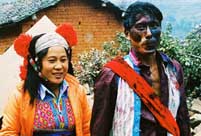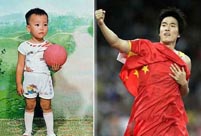Retired professor Zhang Renying’s latest book about the history of Chinese civilization was published last month. The author, who just turned 99 last month, says he plans to publish another book next year to celebrate his centenary.
Fellow nonagenarian Wu Mengchao, who is 91, is opening a new liver cancer research center to pursue the No. 2 killer disease in China.
Wang Meifeng, 83, who has always dreamed of going to Taipei to visit a cousin she hasn’t seen for 60 years, is leaving for Taiwan next month.
Dreams are often associated with the young, but as Zhang, Wu and Wang demonstrate, there’s really no age limit. And perhaps it’s dreams that help perpetuate a youthful spirit behind the wrinkles of age.
Young people tend to fear old age. On a popular Chinese social media site, one of the most-tweeted lines is: “If we don’t pursue dreams today, we will be too old to do so tomorrow.”
The Chinese words mao die (耄耋) are often used to refer to those 70 and older, but the translation isn’t a particularly flattering stereotype. They mean “aged and confused.”
A better set of adjectives to describe the generation born before 1949 would probably be “resilient, frugal, practical, humble and trusting.”
This generation lived through a remarkable history, from the War of Resistance Against Japanese Aggression (1937-45) and civil war to the great famine and social upheaval.
They have watched in wonder at an economic miracle that turned rice paddies into gleaming skyscrapers, that replaced bicycles with cars and that brought telephones, air conditioners, color television and computers into their homes, and subway service, jumbo jets and flashy shopping malls into their lives.
In their youth, it was considered a feat to live to the age of 70. Now that’s almost become late middle age. Life expectancy in Shanghai has extended beyond 80.
One casualty of the economic miracle has been the erosion of the traditional extended family.
Caring for the aging population has become a much-discussed social issue. Young people often don’t have the time or the interest to care for elderly relatives, and there are too few beds in care homes to accommodate demand.
The Chinese government has even passed a law ordering young people to visit or otherwise get in touch with their elders “frequently.”
For this concluding piece of the “Chinese Dream” series, Shanghai Daily interviewed those who were born before 1949, the year when the People’s Republic of China was founded.
“For those about my age and older, there is always this feeling that our destiny, our life and our dreams are inevitably linked to those of the nation,” says retired lawyer Peter Liu, who was born in 1949. “That sense has never gone away.”
He adds, “It may sound funny to today’s young people, but many of us still believe in the idea of self-sacrifice for a bigger cause. Personal dreams are not possible without a good environment and a strong nation. We worked very hard to build this new country when we were young, and now we finally have the time and means to pursue our personal dreams.”

 Pakistan suffers desperate shortage of water
Pakistan suffers desperate shortage of water Lanzhou MAC conducts actual-troop live-ammunition drill
Lanzhou MAC conducts actual-troop live-ammunition drill Heritage train ride across western Kosovo
Heritage train ride across western Kosovo Heavy rain hits Hangzhou, causing traffic jam
Heavy rain hits Hangzhou, causing traffic jam Students wade through water to school
Students wade through water to school Dabaiyi wedding ceremony in China's Yunnan
Dabaiyi wedding ceremony in China's Yunnan Harbin named Chinese city with most beautiful women
Harbin named Chinese city with most beautiful women Weekly Sports Photos: Bale transfers to Real Madrid
Weekly Sports Photos: Bale transfers to Real Madrid Funniest photos of sport stars as kids
Funniest photos of sport stars as kids  Residences of the royal house of Savoy
Residences of the royal house of Savoy China's frigate 'Bengbu'in fire training
China's frigate 'Bengbu'in fire training The last days of Wan Aihua
The last days of Wan Aihua Highlights at 12th National Games of China
Highlights at 12th National Games of China Beijing Film Academy welcomes freshmen
Beijing Film Academy welcomes freshmen 2013 Taiwan Int'l Tourism Expo kicks off in Taipei
2013 Taiwan Int'l Tourism Expo kicks off in TaipeiDay|Week|Month